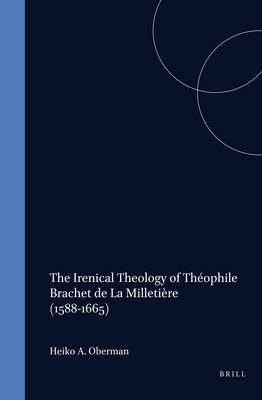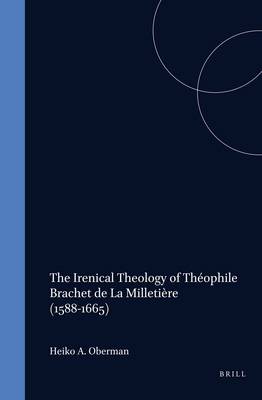
- Afhalen na 1 uur in een winkel met voorraad
- Gratis thuislevering in België vanaf € 30
- Ruim aanbod met 7 miljoen producten
- Afhalen na 1 uur in een winkel met voorraad
- Gratis thuislevering in België vanaf € 30
- Ruim aanbod met 7 miljoen producten
The Irenical Theology of Théophile Brachet de la Milletière (1588-1665)
R J M Van de Schoor
€ 236,95
+ 473 punten
Omschrijving
In this study the content and background of La Milletière's irenism are analysed and compared to the irenism of Hugo Grotius, who strove for unity in this same period. The reactions which La Milletière's books and pamphlets provoked are related to the rival groups within each confession: Jansenists versus Jesuits, the scholars of Saumur versus orthodox theologians like Rivet and Du Moulin and the ministers of Charenton.
Richelieu's conciliatory religious policy was experienced by the oppressed French Calvinists as a major threat to the integrity of their doctrine. When one of their co-religionists, La Milletière, began to propagate a reunification of Protestants and Roman-Catholics, they did not fail to recognize these irenic proposals as Richelieu's. On the other hand, the Roman Catholics mistrusted this peacemaker as well.
This book therefore offers a contribution to the history of irenism, as well as an analysis of the religious situation in France in the first half of the seventeenth century.
Richelieu's conciliatory religious policy was experienced by the oppressed French Calvinists as a major threat to the integrity of their doctrine. When one of their co-religionists, La Milletière, began to propagate a reunification of Protestants and Roman-Catholics, they did not fail to recognize these irenic proposals as Richelieu's. On the other hand, the Roman Catholics mistrusted this peacemaker as well.
This book therefore offers a contribution to the history of irenism, as well as an analysis of the religious situation in France in the first half of the seventeenth century.
Specificaties
Betrokkenen
- Auteur(s):
- Uitgeverij:
Inhoud
- Aantal bladzijden:
- 279
- Taal:
- Engels
- Reeks:
- Reeksnummer:
- nr. 59
Eigenschappen
- Productcode (EAN):
- 9789004099616
- Verschijningsdatum:
- 1/10/1994
- Uitvoering:
- Hardcover
- Formaat:
- Genaaid
- Afmetingen:
- 165 mm x 250 mm
- Gewicht:
- 666 g

Alleen bij Standaard Boekhandel
+ 473 punten op je klantenkaart van Standaard Boekhandel
Beoordelingen
We publiceren alleen reviews die voldoen aan de voorwaarden voor reviews. Bekijk onze voorwaarden voor reviews.









